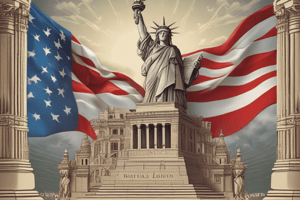Podcast
Questions and Answers
What does the principle of the rule of law ensure regarding government institutions?
What does the principle of the rule of law ensure regarding government institutions?
- They are subject to the whims of public opinion.
- They can operate independently of the Constitution.
- They have unlimited power over individuals.
- They must adhere to constitutional law. (correct)
Which of the following is NOT a premise of the rule of law?
Which of the following is NOT a premise of the rule of law?
- All individuals retain fundamental human rights.
- Government institutions are bound by the Constitution.
- All people are equal before the law.
- Judges must operate independently from the government. (correct)
What is one way the High Court contributes to upholding constitutional law?
What is one way the High Court contributes to upholding constitutional law?
- By creating new laws.
- By approving all legislation without review.
- By allowing statutes to be challenged as 'ultra vires'. (correct)
- By promoting public opinion in legal matters.
How does the principle of equality before the law influence government power?
How does the principle of equality before the law influence government power?
What does the separation of powers principle aim to prevent?
What does the separation of powers principle aim to prevent?
Under the rule of law, which statement regarding the status of individuals is true?
Under the rule of law, which statement regarding the status of individuals is true?
What role does a responsible government play in the context of the rule of law?
What role does a responsible government play in the context of the rule of law?
What concept distinguishes the rule of law from rule by law?
What concept distinguishes the rule of law from rule by law?
What fundamental right ensures that no individual can be punished without proof of guilt?
What fundamental right ensures that no individual can be punished without proof of guilt?
Which institution resolves disputes and ensures that legal processes uphold fundamental rights?
Which institution resolves disputes and ensures that legal processes uphold fundamental rights?
What is a significant role of parliaments in the Australian legal system?
What is a significant role of parliaments in the Australian legal system?
The right to life is considered an inalienable right because it cannot be violated without what?
The right to life is considered an inalienable right because it cannot be violated without what?
What principle enshrines the concept that individuals are innocent until proven guilty?
What principle enshrines the concept that individuals are innocent until proven guilty?
Which of the following is NOT a feature of procedural fairness in judicial processes?
Which of the following is NOT a feature of procedural fairness in judicial processes?
The separation of powers among legislative, executive, and judicial branches serves to protect against what?
The separation of powers among legislative, executive, and judicial branches serves to protect against what?
Which of these is an example of a law that protects fundamental human rights in Australia?
Which of these is an example of a law that protects fundamental human rights in Australia?
Flashcards are hidden until you start studying
Study Notes
Rule of Law
- Emphasizes supremacy of constitutional law: Government institutions can only exercise power in accordance with the Constitution
- All institutions and individuals are bound by constitutional law, acting as a safeguard against government overreach
- The High Court ensures this principle by challenging statutes thought to be "ultra vires" (outside the legislative power)
- Ensures equality before the law: All people are treated equally in matters related to government power
- This principle aims to prevent any section of the community or individual from being arbitrarily discriminated against
- Emphasizes existence and respect for fundamental human rights: Institutions must exercise power while respecting individual rights
- Laws cannot be made to remove these rights, unless compelling reasons exist, such as presumption of innocence being a natural right
- Stripping individuals of fundamental rights gives the state too much arbitrary power
Institutions and Rule of Law
-
Parliaments make laws consistent with constitutional powers, protecting human rights, and ensuring the democratic process
-
Courts act as the institution resolving legal disputes, ensuring parliaments operate within the Constitution
-
The High Court resolves disputes related to the validity of federal and state laws
-
Courts also protect fundamental rights during legal disputes, ensuring fair and equitable treatment for both parties
Applications of the Rule of Law
- Separation of powers acts as a system of checks and balances to prevent abuse of power
- Judicial independence provides a neutral and impartial body to interpret and apply the law
- Open and transparent electoral processes with universal franchise and secret ballots ensure democratic participation
- Procedural fairness guarantees independent and impartial arbiters, fair and continuous trials, and the presumption of innocence
Studying That Suits You
Use AI to generate personalized quizzes and flashcards to suit your learning preferences.




